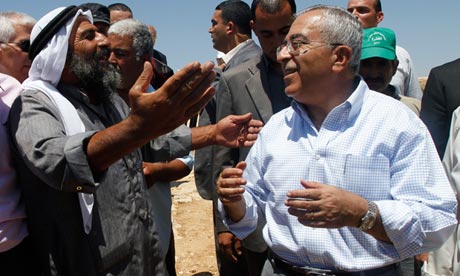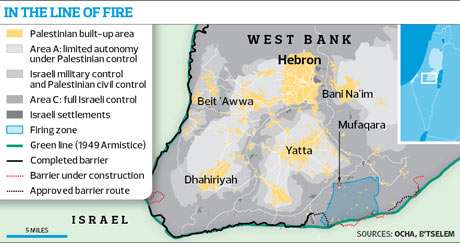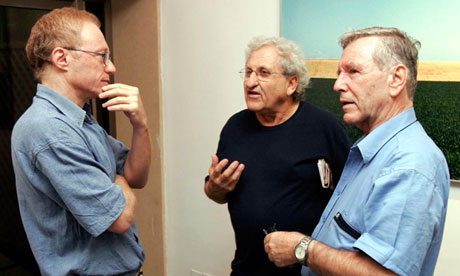Israeli authors fight to stop eviction of Palestinian villagers from army zone
 Monday, July 1, 2013 at 06:09PM
Monday, July 1, 2013 at 06:09PM 25 Israeli authors sign petition as Palestinians face being evicted from caves in live-fire training zones and moved to nearby towns.
By Harriet Sherwood The Observer Saturday 29 July 2013

On the sun-baked, windswept, near-barren hills of the southern West Bank, a thousand Palestinian villagers are braced for the final act in a long drama that could sweep away a tradition of goat-herding and cave-dwelling in an area designated as an Israeli military training zone.
In a little over two weeks, Israel's supreme court will hear an appeal on behalf of the villagers against the planned evacuation of eight communities in the South Hebron Hills. If the 13-year legal battle over Firing Zone 918 ends in Israel's favour, the bleat of goats will be replaced by the crack of assault rifles and the villagers will be moved into a nearby town. The Israeli government's position is that, as a military training zone including live fire, the area is not a suitable environment for permanent residence.
In the past week, support for the villagers has come from an unexpected source: 25 of Israel's best-known authors signed a petition calling for the communities to be saved. Written by the internationally acclaimed novelist David Grossman, the appeal's signatories include Amos Oz, AB Yehoshua, Meir Shalev and Sayed Kashua.
"For the past 20 years, Israel has been actively expelling and displacing the inhabitants of the South Hebron Hills villages," it says. "These villagers have always practised a unique lifestyle: most of them are cave-dwellers and find their livelihood in sheep and goat-herding and small crop farming. Over these years, they have suffered unceasing harassment by the Israeli army and settlers ... They live in constant fear, helplessly facing a ruthless power that does everything to displace them from the home they have inhabited for centuries."
It goes on: "In a reality of ongoing occupation, of solid cynicism and meanness, each and every one of us bears the moral obligation to try to relieve the suffering, do something to bend back the occupation's giant, cruel hand."

Credit: Observer graphics
The area of 12 square miles was designated a military training zone by Israel in the 1980s, but it was not until 1999 that action was taken to clear the land of its inhabitants.
The villagers were forcibly evicted, all structures were demolished and inhabited caves were filled with rubble and blocked up. But a court injunction allowed some villagers to return pending a decision on a legal challenge to the evictions. The case was frozen from 2005 until last year, leaving the threat of forced removal and demolitions.
It is a remote and undeveloped landscape, rolling towards the Negev desert. Tarpaulin tents and breeze-block shelters are scattered over the dry, stony hills. There are almost no paved roads, and none of the villages is connected to a water supply or the electricity grid. Families depend on a few solar power panels donated by European governments and aid groups, rare rainwater and expensive water supplies brought in by tractor from the nearest town. During the long, arid, summer months, families spend almost half their income on water for themselves and their livestock.
Meanwhile, hardline Israeli settler outposts on the edge of Firing Zone 918 are hooked up to water and power, served by paved roads and protected by the Israeli army. The Palestinian villagers and their livestock are subject to frequent intimidation and violent beatings by the radical settlers; tyres have been slashed. For several years, village children have been given a court-ordered army escort on their walk to school following abuse and stone-throwing by settlers.
"This is a group of poor and miserable people who are being constantly harassed and attacked – and my country's army is obeying the command of the settlers in this area," Meir Shalev, an award-winning novelist and one of the signatories to the authors' petition, told theObserver. "These people are being driven away, and if you have some kind of heart it's something you should protest against."
The villagers' Israeli lawyers say the land's ownership is not in question. "I have three huge files of land ownership in this area. It's not disputed that this is privately-owned land," said Shlomo Lecker.
The Israeli state attorney told the supreme court last year that the land was needed for military training, and that the villagers' permanent residence was incompatible with exercises involving live fire. But critics say that the context of Firing Zone 918 is the Israeli government's desire to clear "Area C" – the 60% of the West Bank under full Israeli control – of Palestinians by moving residents into towns in "Area A", the 18% of the West Bank under full Palestinian Authority control. Under international humanitarian law, the transfer of occupied populations is forbidden unless it is temporary and in the context of active hostilities.
Mahmoud Hamamdeh, the chief of Mufaqara village, which faces multiple demolition orders, said the communities lived in "dignity and honour" until "the cancer of settlements began". Using the Arabic word for steadfast perseverance, he added: "Israel may destroy our cement, but it will never destroy our sumud."
Shalev said he hoped the authors' petition would awaken the Israeli public to the Palestinian villagers' plight, but was doubtful of its impact. "Israeli society has become deaf and blind to the moral aspects of the occupation. Today there are more Israelis active in the rights of street cats in Tel Aviv than these poor people in caves," he said.
-------------------------------------------------------------------------------------------------------------------------------
Israeli authors campaign against eviction of West Bank villagers
http://www.guardian.co.uk/world/2013/jun/25/israeli-authors-campaign-west-bank-villagers
by Harriet Sherwood The Guardian 25 June 2013
David Grossman, Amos Oz and A.B. Yehoshua are among 24 writers calling for a reprieve for villages in the South Hebron Hills. 
The acclaimed Israeli authors David Grossman, AB Yehoshua and Amos Oz. Photograph: Getty Images
Some of the most celebrated figures in Israeli literature are campaigning to stop the forcible eviction of Palestinian communities in the barren hills of the southern West Bank to clear land for an Israeli military firing zone.
Twenty four authors – including the acclaimed triumvirate of David Grossman, Amos Oz and AB Yehoshua – have put their names to an appeal to save the villages of the South Hebron hills.
The population of around 1,000 lives "in constant fear, helplessly facing a ruthless power that does everything to displace them from the home they have inhabited for centuries", according to the letter, which was written by Grossman.
It went on: "In a reality of ongoing occupation, of solid cynicism and meanness, each and every one of us bears the moral obligation to try and relieve the suffering, do something to bend back the occupation's giant, cruel hand."
The villagers, many of whose parents and grandparents lived in caves and who still eke a traditional existence herding sheep and goats on the windswept rocky hills, were issued with evacuation orders by the Israeli military in 1999. They have been fighting the orders through the Israeli courts ever since, with a new hearing scheduled in the supreme court in three weeks.
The area – around 3 sq km – was designated as "Firing Zone 918" in the 1970s. About 18% of the West Bank has been designated military training zones by Israel.
According to the Association of Civil Rights in Israel, international laws of occupation forbid the transfer of populations unless it is temporary or for immediate military needs, such as the prosecution of war.
Since the evacuation orders were issued, four of the 12 villages have been reprieved, leaving eight earmarked for demolition. The villagers say their presence in the area dates back up to 350 years, and many have land ownership documents dating from the Ottoman era.
"I have three huge files of documents of land ownership in this area," said the Israeli lawyer Shlomo Lecker, who represents some of the villagers. "It is not disputed that this is privately owned land."
He claimed the threatened evacuation was part of a wider process of Israel clearing Palestinians from land in Area C, the 62% of the West Bank under total Israeli control and where its settlements are located.
Mahmoud Hamamdeh, the chief of Mufaqara village, said he, his father and his grandfather were born in the area. "Despite the fact we lived in caves, we had dignity and honour," he said, before the "cancer of settlements" took hold in the 1980s. "That was when the real struggle began." His house, along with the village mosque, was demolished in November 2011.
Israeli settlements and outposts hug the north and west of Firing Zone 918, and its south is bordered by the pre-1967 green line and the separation barrier. Violent attacks by hardline settlers on Palestinians and their property are common; the Israeli army escorts children from Mufaqara and other villages to and from school outside the military zone each day to protect them from attack.
Three of the signatories on the authors' petition visited Mufaqara on Tuesday to meet villagers. Zeruya Shalev said Israel was "a country of which I am ashamed" and the people of Mufaqara were "not a threat to the state of Israel".
Eyal Megged said literature served a purpose in awakening readers' interest in what was happening around them. "Here, it's not just about politics, but it's a moral and a human issue. This is the stuff that literature is concerned with, it deals with the human condition."
The Israeli ministry of defence told the supreme court last year that the topographical character of the area made it highly suitable for military training. It said permanent residence should be prohibited but villagers could be allowed to work their land or graze their flocks at weekends, Jewish holidays and two periods of one month each year. It also said many buildings and structures in the area had been constructed without permission.
 APJP |
APJP |  Post a Comment |
Post a Comment |
Reader Comments